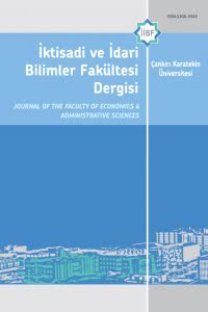TÜRKİYE’DE TURİZM VE EKONOMİK BÜYÜME ARASINDAKİ DOĞRUSAL OLMAYAN NEDENSELLİK İLİŞKİSİ
Öz Politika yapıcıları için uluslararası turizmin ekonomik büyümeye etkisi önemli bir makroekonomik konulardan birini oluşturmaktadır. Bu çalışmada, gelen turist sayısı, turizm gelirlerinin Gayri Safi Yurtiçi Hasıla (GSYH) içindeki payı ve kişi başına düşen GSYH arasındaki nedensellik ilişkisi doğrusal olmayan ilişkileri de dikkate alarak 1963-2016 yılları için test edilmiştir. Çalışmada, Türkiye’de turist sayısından kişi başına düşen GSYH’ye bir nedensellik ilişkisi bulunamazken, kişi başına düşen GSYH’nin turist sayısının nedeni olduğuna yönelik kanıtlar doğrusal olmayan yöntemlerle elde edilmiştir. Diğer yandan, kişi başına düşen GSYH ve GSYH içindeki turizm gelirlerinin payı arasında çift yönlü doğrusal olmayan nedensellik ilişkisi bulunmuştur.
Anahtar Kelimeler:
Turizm, Ekonomik Büyüme, Doğrusal Olmayan Birim Kök ve Nedensellik Testi
___
Balli, E., Sigeze, C., Manga, M., Birdir, S., & Birdir, K. (2019). The relationship between tourism, CO2 emissions and economic growth: a case of Mediterranean countries. Asia Pacific Journal of Tourism Research, 24(3), 219-232.Becker, R., Enders, W. ve Lee, J. (2006). A stationarity test in the presence of an unknown number of smooth breaks. Journal of Time Series Analysis, 27(3), 381-409.
Christopoulos, D. K. Ve Leon-Ledesma, M. A. (2010). Smooth Breaks and Non-Linear Mean Reversion: Post-Bretton Woods Real Exchange Rates. Journal of International Money and Finance, 29, 1076–1093.
Demiroz, D. M. ve Ongan, S. (2005). The contribution of tourism to the long-run Turkish economic growth. Ekonomický časopis, 9, 880-894.
Diks, C. ve Panchenko, V. (2006). A new statistic and practical guidelines for nonparametric Granger causality testing. Journal of Economic Dynamics and Control, 30(9-10), 1647-1669.
Emirmahmutoglu, F., & Kose, N. (2011). Testing for Granger causality in heterogeneous mixed panels. Economic Modelling, 28(3), 870-876.
Enders, W.ve Lee, J. (2012). A Unit Root Test Using a Fourier Series to Approximate Smooth Breaks. Oxford Bulletin of Economics and Statistics, 74(4), 574–599.Gokovali, U. (2010). Contribution of tourism to economic growth in Turkey. Anatolia, 21(1), 139-153.
Gunduz, L. ve Hatemi-J, A. (2005). Is the tourism-led growth hypothesis valid for Turkey?. Applied Economics Letters, 12(8), 499-504.
Hiemstra, C. ve Jones, J. D. (1994). Testing for linear and nonlinear Granger causality in the stock price‐volume relation. The Journal of Finance, 49(5), 1639-1664.
Husein, J. ve Kara, S. M. (2011). Research note: Re-examining the tourism-led growth hypothesis for Turkey. Tourism Economics, 17(4), 917-924.
Johansen, S. (1988). Statistical analysis of cointegration vectors. Journal of economic dynamics and control, 12(2-3), 231-254.
Johansen, S. ve Juselius, K. (1990). Maximum likelihood estimation and inference on cointegration—with applications to the demand for money. Oxford Bulletin of Economics and statistics, 52(2), 169-210.
Kaplan, M. ve Çelik, T. (2008). The impact of tourism on economic performance: the case of Turkey. The International Journal of Applied Economics and Finance, 2(1), 13-18.
Katircioglu, S. T. (2009). Revisiting the tourism-led-growth hypothesis for Turkey using the bounds test and Johansen approach for cointegration. Tourism Management, 30(1), 17-20.
Kizilkaya, O., Sofuoglu, E., & Karaçor, Z. (2016). Türkiye'de Turizm Gelirleri-Ekonomik Büyüme Iliskisi: ARDL Sinir Testi Yaklasimi. Yonetim ve Ekonomi, 23(1), 203.
Manga, M., & Balli, E. (2019). Turizm, Ekonomik Büyüme, Ticari Açıklık ve Finansal Gelişme Arasındaki İlişki: Türkiye Örneği. Finans Politik & Ekonomik Yorumlar, 56(647), 9-22.
Ranjbar, O., Chang, T., Elmi, Z. M. ve Lee, C. C. (2018). A New Unit Root Test against Asymmetric ESTAR Nonlinearity with Smooth Breaks. Iranian Economic Review, 22(1), 51-62.
Sollis, R. (2009). A simple unit root test against asymmetric STAR nonlinearity with an application to real exchange rates in Nordic countries. Economic modelling, 26(1), 118-125.
Tugcu, C. T. (2014). Tourism and economic growth nexus revisited: A panel causality analysis for the case of the Mediterranean Region. Tourism Management, 42, 207-212.
TÜİK (2018), http://www.tuik.gov.tr. (Erişim Tarihi: 01.01.2018).
TURSAB (2018), https://www.tursab.org.tr/istatistikler. (Erişim Tarihi: 01.01.2018).
World Development Indicators (WDI), (2018). https://databank.worldbank.org/ (Erişim Tarihi: 01.01.2018).
World Travel and Tourism Council (WTTC), (2018). https://www.wttc.org/. (Erişim Tarihi: 01.01.2018).
- ISSN: 1308-5549
- Başlangıç: 2011
- Yayıncı: Çankırı Karatekin Üniversitesi
Sayıdaki Diğer Makaleler
TÜRKİYE’DE TURİZM VE EKONOMİK BÜYÜME ARASINDAKİ DOĞRUSAL OLMAYAN NEDENSELLİK İLİŞKİSİ
Esra BALLI, Çiler SİGEZE, Nuran COŞKUN
Türkiye Muhasebe Standartlarının (TMS) Türk Sigortacılık Sektörü Üzerindeki Etkileri
Türkiye’de Turizm ve Ekonomik Büyüme Arasındaki Doğrusal Olmayan Nedensellik İlişkisi
Çiler SİGEZE, Nuran COŞKUN, Esra BALLI
İşsizlik, Döviz Kuru ve Döviz Kuru Oynaklığı İlişkisi: Türkiye için Analizi
Askeri Değişim: Soğuk Savaş Sonrası Dönem Üzerine Bir İnceleme
Unemployment, Exchange Rate and Exchange Rate Volatility Relation: Analysis for Turkey
Ters Veri Zarflama Analizi Yöntemiyle Global2000 Firmalarında Kaynak Tahsisi
Türkiye İmalat Sanayii'nde Endüstri İçi Ticaretin Ölçülmesi: 1997-2017 Dönemi
